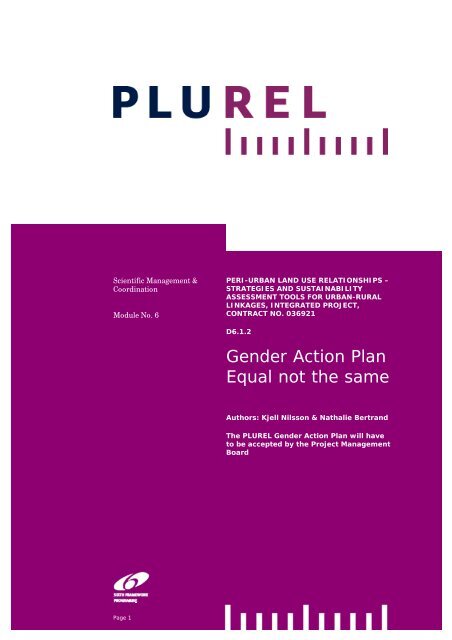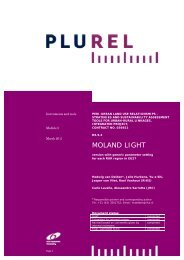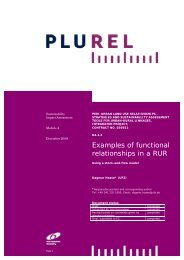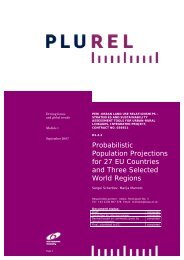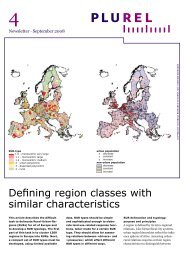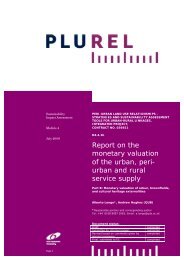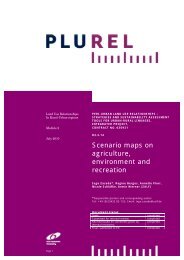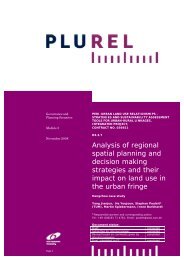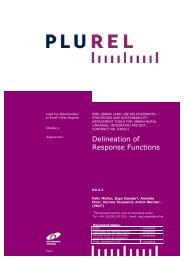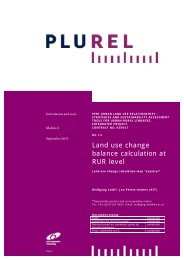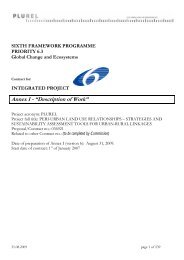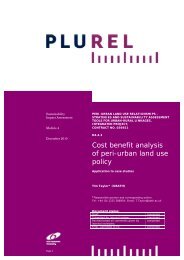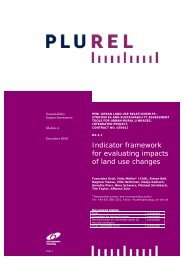D612 D614 Gender Action Plan - Plurel
D612 D614 Gender Action Plan - Plurel
D612 D614 Gender Action Plan - Plurel
You also want an ePaper? Increase the reach of your titles
YUMPU automatically turns print PDFs into web optimized ePapers that Google loves.
AbstractThe role of gender equality and gender balance contributing to the excellence in researchand management is addressed in the PLUREL project by the <strong>Gender</strong> Ombudsman andthe individual PLUREL partner institutions. PLUREL has set up an action plan topromote women and implemented an ongoing sex-disaggregated monitoring concerningall gender relevant issues.The PLUREL <strong>Gender</strong> <strong>Action</strong> <strong>Plan</strong> (GAP) is comprised of a total of 18 actions, dividedinto 12 actions concerning the promotion of gender equality in the project (actions tobalance gender within the workforce: 5, actions to promote women in science: 1, raisegender awareness: 2, monitoring actions: 5) and 6 actions concerning the genderdimension of the research contents (raise gender awareness: 1, monitoring actions: 2,actions not assigned to a type: 3).A Joint Inclusion Memorandum on the implementation of measures to thepromotion of gender equality in the Integrated Project PLUREL is signed by all partnerinstitutions.Page 3 • PLUREL report No 4 • September 2007
1 Introduction<strong>Gender</strong> equality implies that all human beings should be free to develop theirpersonal abilities and make choices without limitations set by strict genderroles; that the different behaviour, aspirations and needs of women and menare considered, valued and favoured equally.Concerning the implementation of measures in its <strong>Gender</strong> <strong>Action</strong> <strong>Plan</strong>, the PLURELconsortium strongly supports the European initiatives underway to promote genderequality, notably the EQUAL community initiative programme, as well as the work of theEuropean Parliament’s Committee on Women’s Rights and Equal Opportunities.PLUREL will contribute to gender equality by supporting equal opportunities for men andwomen. <strong>Gender</strong> equality support will apply to both researchers and support personnel.Women and men are entitled to be equally represented in all fields of study and in alltypes of posts. Women and men professionals are equally responsible for all aspects ofPLUREL’s activities.The European Union and the <strong>Gender</strong> IssueThe EU in its fundamental agreements on gender equality has agreed to promote equalitybetween men and women in all societal spheres. The EU principle is based on anddescribed in the following treaties, declarations and action plans:• The Treaty of Amsterdam entrusted the Community with the task of promotingequality between men and women and seeking to eliminate inequality in all itsactions.(http://europa.eu.int/abc/obj/amst/en/ entry in force 1999)• The Community and its Member States were signatories to the Declaration andPlatform for <strong>Action</strong> of the 1995 Fourth World Conference on Women in Beijing.(http://www.un.org/womenwatch/daw/beijing/platform/declar.htm, 1995)• The recent declaration issued by the Commission on the Status of Women at its49 th session (Feb-Mar 2005) reaffirmed the Beijing Declaration and Platform for<strong>Action</strong>. It also pledged to undertake action to ensure their full and acceleratedimplementation.(http://www.un.org/womenwatch/daw/Review/english/49sess.htm, 2005• The Millennium Development Declaration affirms equality as a fundamentalvalue and states that rights and opportunities of women and men must beassured.(http://unstats.un.org/unsd/mi/mi_goals.asp)• The regulation on promoting gender equality in development cooperationCOM (2003) 465 affirms the dual approach to gender mainstreaming involvingsystematic attention to gender equality across all instruments and interventionsas well as the use of specific measures in favour of women.(http://europa.eu.int/eur-lex/en/com/pdf/2003/com2003_0465en01.pdf,2003)• The Programme of <strong>Action</strong> (PoA) on mainstreaming of gender equality COM(2001)295 was set up to provide a set of measurable objectives and sustainedimprovement.(http://europa.eu.int/eur-lex/en/com/cnc/2001/com2001_0295en01.pdf, 2001)Page 4 • PLUREL report No 4 • September 2007
Objectives of the <strong>Gender</strong> <strong>Action</strong> <strong>Plan</strong>The gender mainstreaming approach promoted in PLUREL concerns both theorganisation and management of the project and the research itself.It is PLUREL’s ambition to contribute to gender equality from the start, and to do this notonly by setting ambitions in a targeted manner, but also by monitoring and assessingtheir level of achievement. Therefore we describe here the actual situation and the targetsto be reached during the project. We consider the personnel employment in the different‘forums’; the procedures of organising the research work and managing conferences; andthe sharing and rewarding of workloads.A PLUREL <strong>Gender</strong> Ombudsman has been appointed to monitor progress in atransparent way, with reference to the whole project team and to report to the projectmanagement with concrete recommendations. Project management will reply to thesesuggestions in the same transparent way, with reference to the whole project team,allowing staff to give their view and make suggestions if they wish to do so. It will belogical for the gender situation to be reported in the review reports of the project.PLUREL formulates the <strong>Gender</strong> <strong>Action</strong> <strong>Plan</strong> to propose guidelines to the participatinginstitutions and to the whole consortium on how to implement an engagement withgender issues. The PLUREL <strong>Gender</strong> <strong>Action</strong> <strong>Plan</strong> is designed to support the gendermainstreaming in the project and relies on the issues and types of actions proposed by theEuropean Commission.1. The gender balance needs to be monitored and analysed.2. Measures should be developed and carried out to reach a commitment of allpartner institutions concerning gender issues.3. <strong>Action</strong>s for the promotion of gender equality in the project should be undertaken.4. The gender dimension of the research contents needs to be analysed anddeveloped.Page 5 • PLUREL report No 4 • September 2007
3 Joint commitmentsIn order to implement an equal opportunity action plan under a strict temporal regime,all partners will sign a Joint Inclusion Memorandum (JIM). Regulations include, but arenot restricted to:• The installation of an ombudsman for equality, dealing with all matters of hiring,promotions, and movements of personnel• Publication of all vacancies, in particular urging women to apply, especially infields where usually males dominate• The offer of part-time positions wherever possible• Dedicated offers for vocational training and gender training for females,including career management, communication, rhetoric techniques, and conflictmanagement• Incorporation of gender mainstreaming Modules into training plans in the scopeof PLUREL.Page 8 • PLUREL report No 4 • September 2007
Joint Inclusion Memorandumon the implementation of measures to the promotion of gender equalityin the Integrated Project PLUREL(Description of partner)It is agreed for the PLUREL Integrated Project by all project partners to implement andmaintain measures to promote gender equality. The members of the consortium agree tojointly include in their research activities in the scope of the project to• elect a project ombudsman who will take care of all gender matters, and• to generate statistics on the gender-related activities in the field.As a project partner, we agree to• publish all vacancies and urge women to apply, especially in fields where usuallymales dominate• offer part-time positions whenever possible• offer child care where necessary and possible• offer the opportunity for parental leave• offer Dual Career Service, where requested and available• either urge respective involved staff members to participate in relevant measuresoffered within and outside the project, or separately offer specialised vocationaltraining and gender training for females, including career management,communication, rhetoric techniques, and conflict management (integrated as part ofthe training activities within PLUREL)in the framework of the project and to report to the ombudsman on an annual base.(Location, Date)(Sign, PLUREL partner)Page 9 • PLUREL report No 4 • September 2007
4 Promotion of gender equality inthe projectRecruitment and career supportPLUREL encourages and supports all participating institutions to implement positiveactions for women in recruitment, promotion and career support. If equally qualifiedwomen and men apply to a position, PLUREL strongly recommend employment of aperson of the sex which is balancing the work force.Women and men in the PLUREL consortium should have the chance to find the mostappropriate position according to their individual needs. Women seeking for maledominated career should be supported considering family and profession-relatedrequirements. Each woman and man should have the chance to define her personnel andprofessional objectives for the duration of the PLUREL project and commitherself/himself and her/his institution in reaching these objective.<strong>Action</strong>s to promote women in scienceFemale scientists are encouraged to participate in PLUREL. Especially young womenresearchers finalising the PhD thesis should elaborate a career and training plan andshould be promoted and supported by the PLUREL consortium to continue in researchactivities even after the project has finished.Family friendly working conditionsAchievement of an effective balance by men and women between the demands of theworkplace and the home is of crucial importance for PLUREL. Family friendly workingconditions and competitiveness are not a contradiction in terms. Family-friendly policiescan serve a dual purpose of contributing to the needs of the business as well as meetingthe needs of employees with family responsibilities. Upon agreement with the respectivesupervisor and team certain tasks may be carried out at home. Additionally, workinghours may be adapted to the individual need of employees through the application ofvirtual workplaces and teleworking. Additionally, employees can vary their starting andfinishing times of work.Organisation of conferencesConferences will be scheduled outside main holiday periods, allowing men and womenwith responsibility for school-age children to integrate the travelling and meeting withinregular work weeks. Travelling and meetings should generally take place during workinghours and not run into weekends.<strong>Action</strong>s to raise gender awarenessPLUREL wants to raise awareness in a non-emotional manner about problems womenhave to face in their day to day professional live. PLUREL stresses that male problems areequally important, although different. A web based questionnaire analysing sexdisaggregatedand anonymously the needs, expectations and experiences of women andmen in their working environment will be established. The analysed questionnaires willbe made public in the consortium. The analysis shall give all consortium members thechance to anonymously document and reflect about situation as man or woman on theworking place. Results will be distributed to all partners and commented. Eventuallyactions of the gender action plan will be adapted.DisseminationIn the communication material and activities of the project, researchers working behindthe material should be identified, making sure that women’s work is also reflected,mentioned and rewarded equally. The materials and their content should avoid thepromotion of traditional gender roles.Page 10 • PLUREL report No 4 • September 2007
Monitoring actionsSex-disaggregated data on the share of women and men in the different workforcecategories will be analysed once a year. Data will be analysed and results will be providedto the whole consortium.PLUREL requires from all partner institutions a description of gender actions undertakenonce a year. Data will be analysed and results will be provided to the whole consortium.PLUREL will monitor in a sex-disaggregated manner the publication of articles in peerreviewedjournals. Data will be analysed and results will be provided to the wholeconsortium.Page 11 • PLUREL report No 4 • September 2007
5 <strong>Gender</strong> issues in the research<strong>Gender</strong> is part of PLUREL’s research object, of the sustainability of land use planning forurban regions. In the project’s Scientific Co-ordination Team, a specialist for socialscience appointed. <strong>Gender</strong>, as part of the research object, should have his/her specialattention. It should be reflected in the <strong>Gender</strong> <strong>Action</strong> <strong>Plan</strong> as a research task of this socialspecialist. The appointed <strong>Gender</strong> Ombudsman should be kept informed about this andreport on the inclusion of gender issues in the research.Regarding research on sustainable development, differences in gender roles,responsibilities, access to decision making as well as practical and strategic needs relatedto land use have to be considered, as well as for other different distinctive populationgroups. They will be taken into account and explicitly analysed in the PLUREL project. Agender-sensitive approach will be discussed with all project partners during the firstGeneral Assembly Meeting to ensure awareness of possible gender biases in data analysisand assessment. The selection criteria for regional stakeholders involved in the projectwill therefore include gender balance as one important social criterion.Safe and reliable public transport, access to land, access to mobility, access to decisionmakingforums, quality of life, time for leisure, influences on family life and child-raising,are all examples of land use aspects influencing the ability of human beings to be free todevelop their personal abilities and make choices without limitations set by strict genderroles. In the different research workpackages the gender aspect will be reflected:• In the demographic descriptions, categories will distinguish between men andwomen, in age groups, and in family situations, also paying attention to singleperson households and one-parent familes (M1).• In the studies on governance (M2 and M3) the gender influence on decisionmaking will be discussed.• Research on the various quality of life issues: economic, social, physical andmental health and environment will reflect the gender component and describethe balances (M2).• These fields should also be stipulated in the impact assessments, by bringinggender factors into the model. (M4). When members of focus groups from thecase study regions are used in M4 for data collection, steps will be taken to ensuregender balance in their composition.• In the case study research, intensive discussions with practitioners andstakeholder groups are foreseen. During these discussions equal representationsof men and women should be presented and invited to active participation (M3).When assessing the democratic aspects of decision making and developingenhanced planning strategies, the objective of gender equality will be discussedand reflected in the reports and dissemination (M5).Page 12 • PLUREL report No 4 • September 2007


